London arbitration talk: jurisdictions, sanctions, assets, immunity
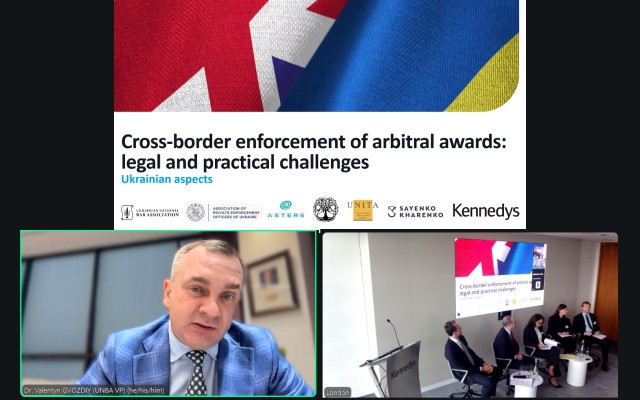
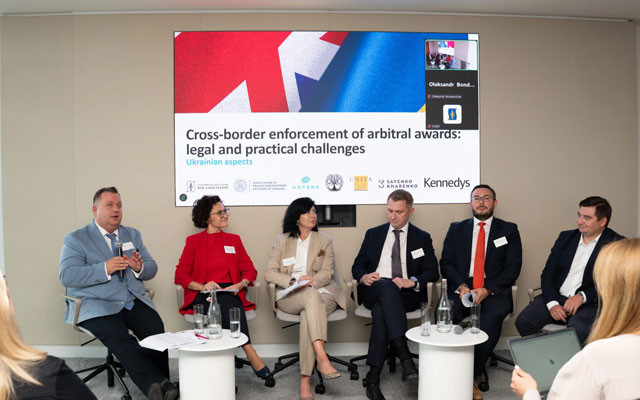
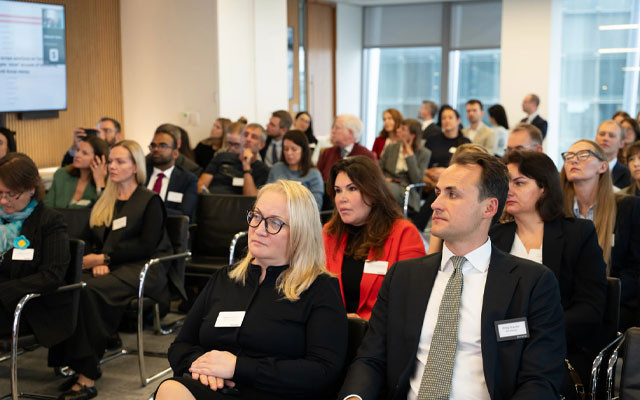
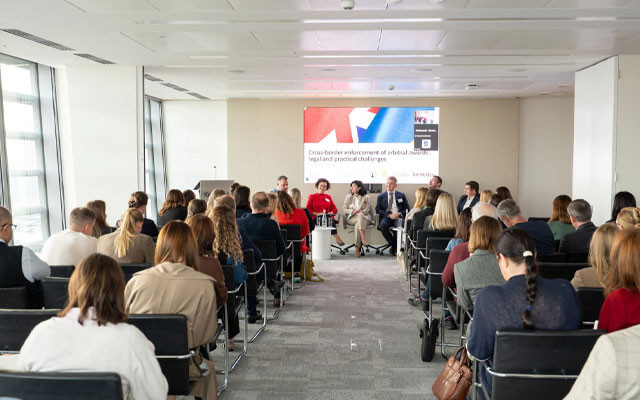
On September 29, experts and practitioners from the UK, Poland, France, USA, UAE and Ukraine gathered in London to discuss the recognition and enforcement of arbitral awards in different jurisdictions, as well as mechanisms for locating and seizing assets.
The international conference was organized by the London office of the international law firm Kennedys with the support of the Ukrainian National Bar Association, the National Association of Arbitration Managers of Ukraine, the Association of Private Enforcement Officers of Ukraine, law firms, and the organization Spilka.uk.
New precedents
In his opening remarks to the participants of the event, the Vice President of the UNBA, BCU Valentin Gvozdiy emphasized that the martial law in Ukraine requires the introduction of extraordinary measures to ensure national security and economic stability. These measures include the direct implementation of international arbitration rules. However, the trust of international partners, businesses, and investors in the country directly depends on the authority of our legal environment as a guarantee that investors' rights will be protected. Therefore, the UNBA has a clear and distinct mission—to provide the Ukrainian legal environment with strong, independent practices, taking into account the best international experience.
One such measure is the nationalization of assets belonging to Russian state-owned companies and sanctioned individuals. By decision of the Ukrainian courts, assets associated with the aggressor state are transferred to the state. These steps are aimed at protecting national security and ensuring reparations. At the same time, they raise a complex set of issues regarding respect for property rights.
Ukrainian courts consider sanctions not only a political tool, but also a public order within the meaning of the New York Convention. This means that sanctioned Russian companies or citizens of the Russian Federation may be denied recognition of their property rights to an asset because they refuse to recognize Ukraine's fundamental rights to sovereignty and national security. These cases demonstrate how sanctions, combined with arbitration law, create new precedents that can be followed and implemented in other jurisdictions.
Finally, V. Gvozdiy noted that international arbitration has undergone significant changes in connection with the Russian-Ukrainian war. Ukrainian investors and the state are parties to numerous international arbitration proceedings against the Russian Federation, including claims under bilateral investment agreements and claims related to the Energy Charter Treaty. At the same time, the UNBA is unquestionably ready to cooperate with professional associations or communities of lawyers in developing and modernizing mechanisms for protecting investors' rights in various jurisdictions.
The experience of France
The first panel of the Conference was moderated by Kennedys partner Oleg Shaulko, who emphasized the positive aspects of international arbitration mechanisms: speed of dispute resolution, independence, and confidentiality.
Kennedys Head of international arbitration practice Thomas Kendra spoke about the enforcement of arbitral awards in France.
He outlined the key stages: filing an application with the court for recognition of the arbitral award, verifying the award's compliance with national legislation and international conventions (in particular, the 1958 New York Convention), as well as the practical aspects of obtaining a writ of execution for the recovery of funds or the performance of other obligations. Particular attention was paid to the time limits for consideration and typical grounds for refusal to enforce.
The advocate cited specific examples of cases where French courts considered the enforcement of arbitral awards between two commercial companies. He highlighted practical lessons from these cases: how courts assess proper notification of the parties, compliance with arbitration procedures, and issues of public policy of the state. T. Kendra drew attention to the trend in judicial practice towards more effective and rapid enforcement of awards, as well as common grounds for appeal that may delay enforcement.
In particular, the advocate noted the problem of enforcing arbitral awards against state bodies or the state as a whole. He noted that although international law and French legislation provide for the possibility of recovery from the state, in practice this is difficult. The consideration of such cases in French courts requires taking into account the principle of state immunity, public order, and specific procedural nuances. At the same time, T. Kendra cited examples of cases where state structures successfully challenged the enforcement of awards, emphasizing that strategic planning and the right basis for arbitration are critical to achieving a positive outcome.
Advantages of the USA
Kennedys USA partner Erdania Perez shared her experience and practical observations on the work of USA federal courts. They continue to demonstrate an extremely favorable position towards the confirmation of commercial arbitration awards. A recent 2024 study covering more than 900 motions for confirmation of awards between 2011 and 2019 showed that more than 90% of international arbitration awards are confirmed in the USA. The remaining 10% of cases are usually resolved after additional motions or through voluntary payment of the debt.
In fact, protection against enforcement of awards in the USA is interpreted very narrowly, which contributes to the effective application of the New York Convention. However, a serious challenge for investors remains when an arbitral award is set aside in the debtor's country of residence. In such cases, USA courts do not always automatically refuse enforcement. As practice shows, they reserve the right to assess enforcement even if the award is set aside abroad, guided by USA public policy.
Recent cases illustrate this clearly: in Compañía De Inversiones Mercantiles S.A. v. Grupo Cementos De Chihuahua (2023), a $35 million arbitral award set aside by Bolivian courts was enforced in the USA. A similar practice was observed in Pemex v. Corporation Mexicanos (SDNY 2013), where a $300 million arbitral award, set aside by Mexican courts, was upheld and enforced in the USA.
It is noteworthy that the outcome largely depends on the specific facts of the case. In parallel proceedings, USA courts often suspend enforcement of awards to avoid conflicting results (Stilex vs Republic of Moldova). This practice forces investors to adapt to a new «waiting game», turning the enforcement of arbitral awards into a strategic process.
For investors, however, the advantages of USA jurisdiction remain significant. Once an arbitral award is confirmed under the Federal Arbitration Act (FAA), it becomes federal and can be enforced throughout the country without the need for repeated petitions in each state. The courts provide broad tools for locating a debtor's assets around the world (NML Capital vs Argentina, 2014), making the USA a uniquely effective venue for recovering funds, even if the assets are hidden or scattered.
Particular attention is paid to the enforcement of arbitral awards against states. American case law limits sovereign immunity through the arbitration exception, which is particularly important in ICSID cases. Recent examples include cases against Spain arising from the Energy Charter Treaty (NextEra Energy Global Holdings B.V., 2024; Infrastructure Servs. Luxembourg S.A.R.L., 2025; Blasket Renewable Invs., LLC, 2025).
However, new challenges are emerging in testing a sovereign’s consent to arbitration. In Hulley Enterprises vs Russian Federation (2025), the District Court of Columbia ruled that prior arbitration awards and confirmations in the Netherlands are not decisive in determining the arbitration exception to immunity. Investors must be prepared for repeated litigation, which increases costs and creates additional risks for sovereigns seeking to challenge their consent.
Of particular interest are cases involving geopolitical disputes, particularly regarding Crimea. Here, US courts effectively become mediators in determining territorial legitimacy by assessing whether a bilateral treaty extends to disputed territories (Stabil LLC vs Russian Federation, 2024).
Summing up her speech, E. Perez emphasized that US jurisdiction remains one of the most attractive for investors seeking to enforce international arbitration awards. However, success depends on careful preparation of documentation, risk management, and strategic planning in cases where awards are set aside or challenged by sovereigns.
British aspects
The specifics of the enforcement of arbitral awards in the United Kingdom were revealed by Kennedys' legal director Alexander Skard. He focused on specific issues relating to the application of the 1958 New York Convention, the 1966 Washington (ICSID) Convention on the Settlement of Investment Disputes between States and Nationals of Other States, and the institution of state immunity.
English arbitration law effectively implements the provisions of the New York Convention and limits the grounds for refusing to recognize and enforce arbitral awards to those expressly provided for in the Convention. At the same time, it leaves discretion to the courts — even if one of the grounds for refusal is formally present, the court may still allow the award to be enforced.
This flexibility demonstrates the strong commitment of the British judiciary to the idea of international arbitration as an effective means of resolving commercial disputes. A telling example is the approach to the so-called «public policy» ground.
The courts of England and Wales interpret the concept of public policy very narrowly. As A. Skard noted, a violation of public policy is understood to mean only actions that would cause general moral outrage — for example, terrorism, human trafficking, or corruption. Therefore, even if an arbitral award contains provisions that are inconsistent with the traditional principles of English contract law (e.g., penalties prohibited under domestic law), the court may still enforce it, citing the public policy preference for supporting international arbitration.
Procedurally, the enforcement of arbitral awards in the UK is governed by Part 62 of the Civil Procedure Rules (CPR), which provides for the fastest and most «mechanical» process possible — without excessive formalities or interference with the content of the arbitral award.
Another advantage of English jurisdiction is the broad powers of the courts to grant interim measures in support of arbitration, both before and after the award is made. This includes, in particular, the possibility of freezing assets or imposing a seizure order to ensure the effective enforcement of the arbitral award.
Unlike the New York Convention, the ICSID Convention provides for an autonomous system of recognition and enforcement of awards. In the UK, these issues are governed by the Arbitration – International Investment Disputes Act 1966.
Under Article 54(1) of the ICSID Convention, each State Party undertakes to recognize the award as binding «as if it were a final judgment of a court of that State». When registering an ICSID award, an English court has no right to review its merits or assess the appropriateness of the arbitration proceedings. However, the key issue remains that of state immunity from enforcement.
The issue of immunity in the United Kingdom is governed by the State Immunity Act 1978 (SIA), which provides for a general rule: states enjoy immunity unless otherwise provided by law. At the same time, section 9 of the SIA makes an exception for arbitration: if a state has agreed to arbitration in writing, it cannot invoke immunity in proceedings related to that arbitration.
However, even in such a case, the enforcement of a decision regarding state assets may be blocked if they are not used for commercial purposes. Central bank assets are particularly protected and are not subject to enforcement at all, even if they are formally intended for commercial use (Article 14(4) of the SIA).
Separately, A. Skard recalled the high-profile case of Hulley Enterprises v. Russia (the Yukos case), in which Russia attempted to challenge the validity of the arbitration agreement in order to avoid enforcement of the awards. However, the English Court of Appeal rejected these arguments, citing the principle of estoppel. After the Dutch Supreme Court recognized the arbitration agreement as valid, the Russian side could not raise this issue again before the English court.
Thus, the practice of English courts demonstrates the most favorable attitude towards the enforcement of international arbitral awards, even in complex cases involving issues of public policy or state immunity. This approach not only strengthens London's reputation as a global arbitration center, but also shapes the international standard of the rule of law in cross-border commercial disputes.
Ukrainian practice
A partner at Asters law firm Oksana Legka presented an analysis of Ukrainian court practice in the field of international arbitration. Her report covered several topical areas at once, from prohibitions on the enforcement of awards involving Russian companies to the impact of sanctions and court practice in cases against foreign states.
O. Legka emphasized that Ukraine, while remaining at the center of an armed conflict, is developing its own concept of arbitration enforcement, balancing international standards and national security.
One of the key elements of the Ukrainian legal regime is the restriction on the enforcement of arbitral awards if the debtor is a defense industry enterprise and the claimant is the Russian Federation or a company affiliated with it. This rule has been in effect since 2018 and reflects the state's principled position on the economic isolation of the aggressor. At the same time, the speaker noted, Ukrainian courts are flexible in cases where the arbitral award has no connection with the Russian Federation.
Thus, in the case of Specijalna Oprema Skopje D.O.O. v. Ukroboronservice (2023), the Supreme Court confirmed that martial law does not exempt defense enterprises from their obligations, but allows for temporary suspension of performance if it could harm the country's defense capabilities. This approach demonstrates the courts' desire to maintain a balance between contractual stability and security interests.
An equally important aspect is the sanctions factor. While until 2022 the courts considered that sanctions did not constitute an obstacle to the recognition of arbitral awards, this approach changed after the start of full-scale war. Today, the imposition of sanctions is seen as an element of public order that directly affects the enforceability of awards.
According to O. Legka, the Ukrainian Supreme Court has recognized that a sanctions act is not only a political instrument but also a legal confirmation of a threat to national interests, and therefore the enforcement of awards in favor of persons subject to sanctions is inadmissible. However, the mechanism for lifting sanctions preserves the possibility of legal rehabilitation of such parties in the future.
The speaker paid particular attention to the issue of sovereign immunity of states, in particular the practice of considering cases against the Russian Federation. In the case of Everest Estate LLC and others v. RF (PCA No. 2015-36), the Supreme Court ruled in 2019 that Russia cannot invoke absolute immunity, as international practice recognizes the principle of limited immunity, which applies if a state voluntarily participates in arbitration proceedings.
It is important that Ukrainian courts apply the concept of double waiver of immunity—if a state has agreed to arbitration through a corresponding reservation, it thereby waives both jurisdictional and executive immunity. This approach is consistent with the provisions of the Law «On international private law» and the 2004 UN Convention on Jurisdictional Immunities of States.
After 2022, Ukraine has not yet received any requests for enforcement of arbitral awards against the Russian Federation, but the practice of lawsuits against Russia for compensation for war damages is actively developing. Courts are increasingly considering such cases through the prism of international tort law, recognizing that aggression cannot be protected by immunity.
Thus, the Ukrainian model of enforcement of arbitral awards is currently undergoing structural transformation. It remains open to international principles, but at the same time affirms the priority of state sovereignty and security. Despite all the challenges, Ukraine maintains its reputation as a state that adheres to the rule of law and international arbitration standards, while creating effective safeguards against abuse by the aggressor country.
Commencement, enforcement, search and seizure
During the second session of the conference, moderated by the representative of the UNBA in the United Kingdom Oleksandr Chernykh, experts from Ukraine, Poland, the United Kingdom, the UAE, and international organizations discussed the commencement of proceedings and recognition of arbitral awards, enforcement mechanisms, search and seizure of assets, new challenges related to digital assets, and the impact of sanctions legislation on law enforcement.
Polish practice was presented by Ewa Rutkowska (LL.M.), who focused in detail on the problems of formalism in the Polish judicial system in the process of recognizing and enforcing arbitral awards. She emphasized that Poland does not have a private enforcement agency, and enforcement is carried out entirely by state bailiffs, which significantly slows down the proceedings. One of the main difficulties is the strict requirement to submit not only the arbitral award itself to the court, but also the original arbitration agreement, which complicates and prolongs the proceedings. According to her, Polish courts adhere to an extremely formalistic approach, which may deter foreign investors and arbitration creditors.
The Ukrainian context was presented by Sayenko Kharenko partner Oleksandr Druh, who outlined the key problems of enforcement of decisions in Ukraine during the period of martial law and sanctions. He recalled the existence of moratoriums prohibiting the enforcement of decisions against certain categories of enterprises, primarily those that are of strategic importance for the defense or energy security of the state. The expert focused separately on the issue of competition between sanctions legislation and arbitration enforcement procedures, where the actions of a party subject to sanctions may be regarded by the courts as a threat to national security. He also shared examples of the enforcement of corporate rights and securities, which in wartime are often the subject of complex disputes and require special attention from the courts.
Managing partner of SYROTA DZIS MELNYK Dmytro Syrota spoke about the experience of the United Arab Emirates, explaining the peculiarities of legislation that combines elements of continental, common law, and Sharia law. He noted that the UAE has a unique mechanism for enforcing decisions through checks, whereby the debtor can issue a check for the amount of the debt. If there are insufficient funds in the account, the situation moves from the civil to the criminal sphere, as the lack of coverage for the check is considered financial fraud. The advocate also drew attention to the peculiarities of enforcement in free economic zones, where, depending on the region, elements of English law may apply, creating opportunities for international investors.
The topic of enforcement of decisions against digital assets took a special place in the discussion. Global Ledger founder Alex Fison presented cases related to the search and seizure of crypto assets, as well as the verification of their origin. He gave examples of how debtors try to evade enforcement or circumvent sanctions restrictions by transferring funds into digital form. According to him, modern blockchain analytics tools allow tracking the movement of such assets and ensuring their fixation, which is becoming one of the key areas in modern arbitration practice.
The role of private enforcement agents and bailiffs in ensuring the actual enforcement of decisions was highlighted by private enforcement agent and bailiff of the High Court of England Seda Akulinina. She stressed that the Ukrainian model of private enforcement, introduced several years ago, has already proven its effectiveness and can serve as an example for other countries. According to the speaker, it is the activity, independence, and professionalism of private enforcement agents that determine the effectiveness of justice, and their interaction with the courts forms a new level of trust in the enforcement system.
Summing up the discussion, O. Chernykh noted that international practice in the enforcement of arbitral awards today requires lawyers not only to be highly qualified in the field of law, but also to understand technological processes, sanctions regimes, and mechanisms of cross-border cooperation. At the same time, arbitration is transforming from a dispute resolution tool into a key element in building trust between states, business, and society.
Popular news
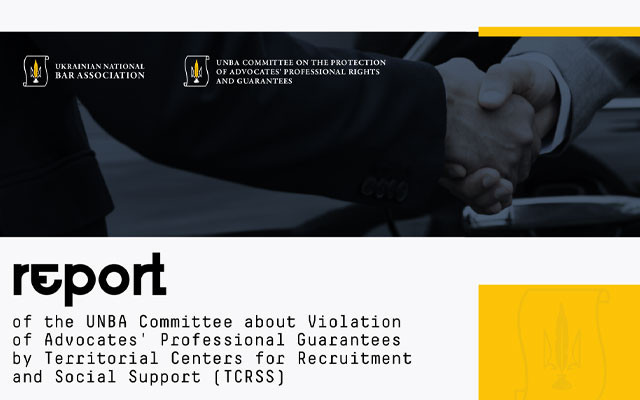
Guarantees of the practice of law
The UNBA presented a report on violations of advocates' rights in the TCC
The Committee for the protection of advocate's rights and guarantees of legal practice of the UNBA has prepared a consolidated report on violations of advocate's professional rights and guarantees of legal practice by territorial recruitment and social support centers for the period from 2022 to the first half of 2025.
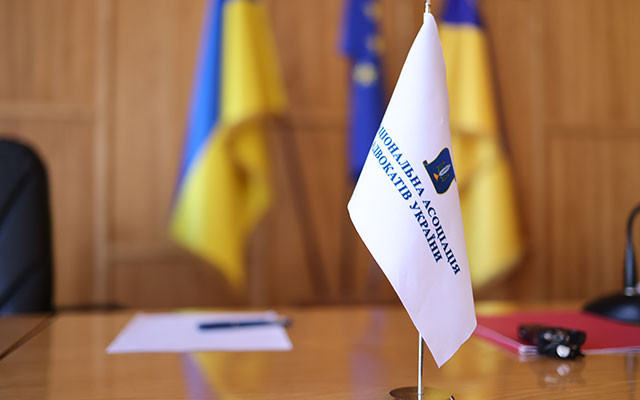
Self-government
Statement by the UNBA Committee regarding manipulative journalistic material
Statement by the UNBA Committee on information policy and interaction with the media regarding manipulative journalistic material aimed at discrediting the advocacy institution.
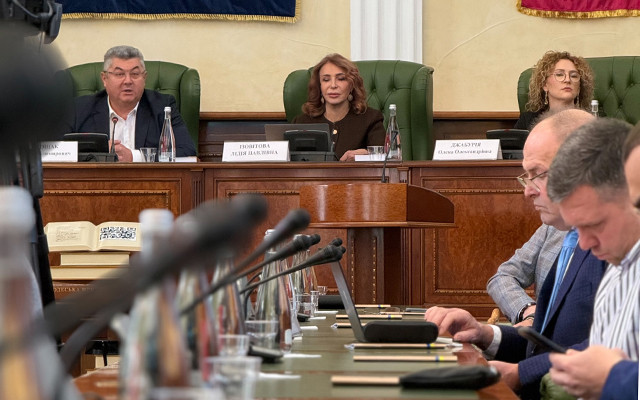
Guarantees of the practice of law
L. Izovitova: today advocacy maintains its independence and fights for guarantees for the profession
The Ukrainian advocacy remains an independent, constitutionally recognized institution of justice, which, in the conditions of war, has not only retained its subjectivity, but also consistently fights for guarantees to protect the profession.

Access to the profession
For candidates for the advocate: BCU has reminded them of the rules for crediting teaching experience
For the purposes of admission to the qualification exam, a candidate's work in scientific and teaching positions may be counted as experience in the field of law only if the position requires legal education.
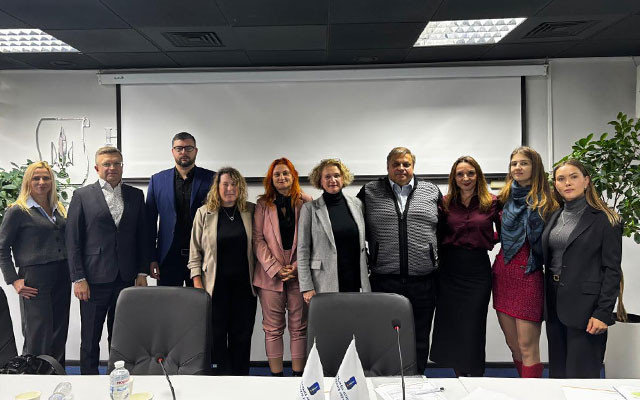
Discussion
Urban Planning Code: what should the new rules for rebuilding Ukraine be?
Does Ukraine need separate codification in the field of urban planning, which model of law to choose, and how to ensure a balance between the interests of the state, communities, businesses, and citizens in the context of post-war reconstruction?
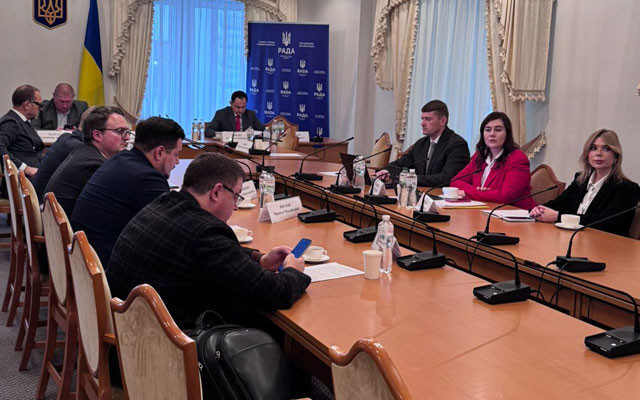
Guarantees of the practice of law
The Verkhovna Rada took another step towards ratifying the Convention on the protection of the profession of advocate
On November 5, the Verkhovna Rada held a working meeting dedicated to the translation of the Council of Europe Convention on the protection of the profession of advocate for its subsequent signing and ratification. The issue was initiated by the Ministry of Foreign Affairs, which drew attention to the key term «lawyer» in the international treaty.
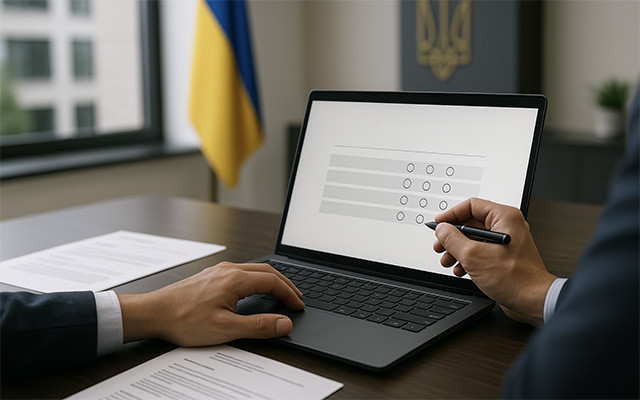
Interaction
NACB is looking for corruption risks in its activities. Advocates are asked to help
The National Anti-Corruption Bureau of Ukraine has launched a survey aimed at gathering information to identify corruption risks in the activities of the National Bureau and prepare an Anti-Corruption Program for 2026–2028.
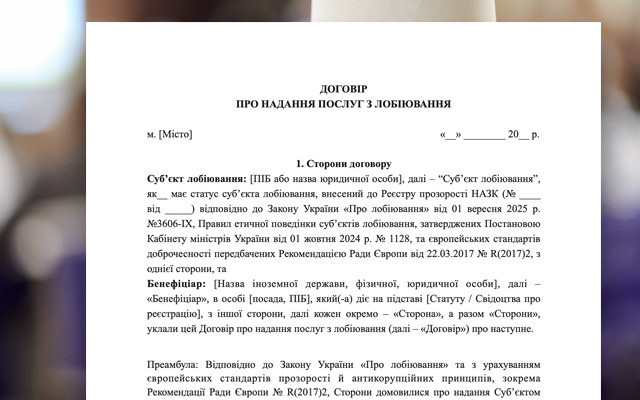
Interaction
Agreement on the provision of lobbying services: a template for advocates has been developed by the UNBA
The Ukrainian National Bar Association has prepared a model agreement for the provision of lobbying services that complies with the requirements of the relevant law and takes into account the specific features of such activities carried out by persons providing legal assistance.
Publications

Censor.net Protecting advocates – protecting justice: addressing concerns about the new law

Ihor Kolesnykov A BRIEF SUMMARY REGARDING THE APPLICATION OF THE ORDER ON EXTENDED CONFISCATION IN LATVIA REGARDING FINANCIAL ASSETS OF…

Valentyn Gvozdiy WORKING IN A WAR ZONE

Lydia Izovitova Formula of perfection

Sergiy Vylkov Our judicial system is so built that courts do not trust advocates

Iryna Vasylyk Advocacy in the proclamation of Independence of Ukraine

Oleksandr DULSKY When we cross the border of the Supreme Anti-Corruption Court, we get into another department of the National Anti-Corruption…

Vadym Krasnyk The UNBA will work, and all obstacles and restrictions are only temporary inconveniences
